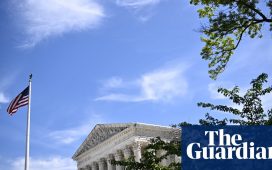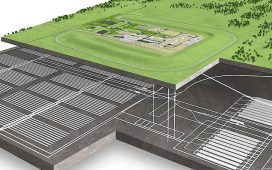Labour party membership fell by almost 25,000 in 2022, while its income rose, figures show
Labour party membership continued to slide last year even as the party enjoyed one of its most financially successful years in recent history, PA Media reports. PA says:
Annual accounts published by the Electoral Commission show Labour had 407,445 members at the end of 2022, down almost 25,000 compared with 2021.
This was well below the recent membership peak recorded at the end of 2019, when there were 532,046 Labour members.
But Labour still achieved some of its highest income levels outside an election year, raising £47.2m and returning a £2.7m surplus after losing £5.2m in 2021.
A report from party treasurer David Evans said “difficult decisions” on reducing costs had contributed to returning Labour to surplus, while membership income “exceeded targets” thanks to new members and “an improved rate of retention”.
Meanwhile, the Conservatives recorded a loss of £2.3m in what the party described as a “turbulent year”.
Income from donations fell by £2.4m compared with 2021, with party officials saying this was partly due to “donor pledges moving into 2023”.
The party does not publish its total membership figure, but income from membership fees fell slightly from £1.99m to £1.97m. Around 170,000 people were eligible to vote in the summer leadership election last year.
The Liberal Democrats recorded a deficit of £753,789 in 2022, including a £185,839 loss incurred due to cancelling the party’s annual conference following the death of Elizabeth II.
The party did, however, record a slight increase in membership from 94,706 to 97,493.
The SNP recorded a deficit of £804,000 during 2022, which it said was not “out of keeping with other years in which nation-wide elections were fought”.
The party’s accounts also show a significant decline in membership since the end of 2021, when there had been 103,884 SNP members.
By the end of 2022, that figure had fallen to 82,598 while the accounts show that number had fallen even further by the end of June 2023, reaching 73,936.
UPDATE: The Labour accounts are here. And this is what they say about membership.
As at 31 December 2022 the total individual membership of the party was 407,445 (2021: 432,213)
Key events
-
Afternoon summary
-
Corbyn says Scotland should be allowed to hold second independence referendum soon
-
Labour says having to be ready for possible snap election in 2022 put strain on party resources
-
SNP says cost of living crisis to blame for party membership falling by 30,000 since 2021
-
Justice secretary Alex Chalk announces independent inquiry into Andrew Malkinson miscarriage of justice case
-
Government spending on asylum has almost doubled in past year to £4bn, figures show
-
Labour party membership fell by almost 25,000 in 2022, while its income rose, figures show
-
New figures suggest PM will struggle to keep pledge to clear ‘legacy’ backlog of asylum claims by December, experts say
-
41% of asylum applications in year ending June 2023 from small boat arrivals, down from 45% previous year, figures show
-
Albania provided most asylum applications in year ending June 2023, figures show
-
Labour says record high asylum backlog figures show system in ‘complete chaos’
-
Asylum applications up 19% in year ending June 2023, figures show
-
Sunak says his international summit on AI safety to take place at Bletchley Park in November
-
People coming to UK on work visas up 45%, figures show
-
Labour says Sunak cases shows why parliamentary standards rules should be tightened
-
71% of initial asylum applications granted, latest figures show
-
Asylum application backlog has reached record high of 175,457, figures show
-
Rishi Sunak apologises for ‘inadvertent’ breach of Commons rules about declaring interests
Afternoon summary
Nadine Dorries, the former culture secretary, has faced fresh criticism today from a Conservative colleague over her refusal to resign as an MP, despite announcing in June she intended to stand down “with immediate effect”.
In an interview with Times Radio, the Tory MP Tom Hunt said Dorries’s conduct was “pretty dreadful”. He said:
The entitlement that seems to have driven the decision in the first place, ie she didn’t get a place in the House of Lords so she’s throwing the towel in, is pretty extraordinary. It will stick in the throat of the majority of her constituents, I imagine …
I certainly don’t want to be associated with Nadine Dorries at all. I don’t know what she’s playing at, and I don’t know what her game is, but I think she’s shown right throughout her career, from the time she went on I’m A Celebrity Get Me Out of Here, she’s shown she has a certain approach to being a member of parliament, and it’s a certain approach that seems to be driven by a degree of entitlement.
Corbyn says Scotland should be allowed to hold second independence referendum soon
Jeremy Corbyn, the former Labour leader, has said that the party should allow Scotland to hold a second independence referendum.
Speaking at an event at the Edinburgh festival fringe, Corbyn said:
I do support the principle of having a referendum and I hope that happens soon.
I suspect the British government will try and oppose it – I hope that a Labour majority would also support a referendum. I think it’s a democratic right to decide your own future …
My view is that if the people of Scotland want that referendum to defend their future, then they should have that right.
I don’t think there should be a power of veto by the UK government or the UK prime minister on this.
I made clear before the 2019 election that if we went into government we would be accepting of the principle that if Scotland wanted a referendum after two years, that would be what we would agree to do – that’s what I said at the time and that’s what I stand by.
The Scottish government can only hold an independence referendum with permission from the UK government and Rishi Sunak’s government is opposed. Keir Starmer is also against the proposal.
At the event Corbyn – who has had the Labour whip withdrawn because of what he said about the Equality and Human Rights Commission report into antisemitism in the party when he was leader and who will not be allowed to stand again as a Labour parliamentary candidate – said he had been “treated very badly” by the party.
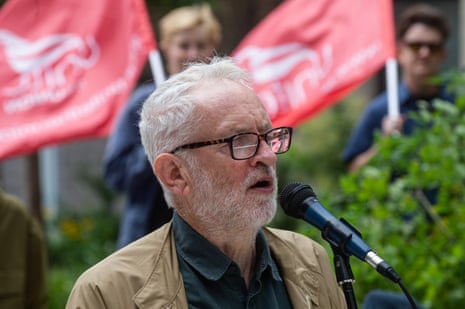
Commenting on the Labour party accounts (see 12.18pm and 2.05pm), a party spokesperson said:
Thanks to Keir Starmer’s leadership, the Labour party saw significant financial growth throughout 2022, and our finances have gone from strength to strength this year as we set out our five missions to transform Britain.
The Labour party is a changed party that is serious about getting into government and building a better Britain.
Momentum, the leftwing Labour group originally set up to promote Jeremy Corbyn and his agenda, says it is “saddening and worrying” that party membership has fallen for the third year in a row. (See 12.18pm.) It says:
When Keir Starmer ran for leader he celebrated Labour’s mass membership and pledged to build on the people-powered party built after 2015. Yet since then he has turned Labour back towards corporate donors and interests, rejecting member and union demands for popular, urgent policies like public ownership, while undermining their rights by stitching up parliamentary selections for loyalists.
Britain already has a party funded by the few and serving the few: the Tories. We need a Labour party funded by and run for the many, one that is true to its trade union roots and its founding mission.
These are Labour’s membership figures for the past four years.
December 2019: 532,046
December 2020: 523,332
December 2021: 432,213
December 2022: 407,445
And here are the equivalent income and expenditure figures for the Conservative party in 2022, taken from the party’s accounts published by the Electoral Commission today.
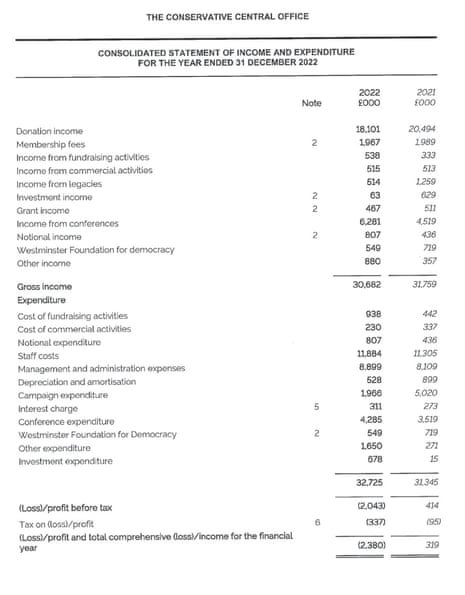
Labour says having to be ready for possible snap election in 2022 put strain on party resources
In his report included in the Labour party accounts for 2022 submitted to the Electoral Commission, David Evans, the general secretary and registered treasurer, says one problem he faced last year was having to be ready for a snap election. He says:
The year began with a number of known challenges and opportunities for the party and as always, further challenges and opportunities arose during the year …
One such challenge for the year was the potential for a snap general election during a turbulent time at the top of the government. Continuously being in a state of election-readiness can be demanding on the party’s resources and staff, however the party remains ready to fight a general election to deliver a Labour government at any time.
Given that Labour was ahead in the polls for the whole of 2022, a snap election was always unlikely. But it has been revealed that at one point Boris Johnson and his inner circle considered whether calling a snap election might enable him to see off Tory attempts to get rid of him as leader.
In his report Evans also says that in 2022 Labour income reached one of its highest levels for a non-election year. He says:
Some of the difficult decisions taken by the party in recent years to reduce the cost base are apparent in these financial results with running costs much reduced. However, income generated by the party grew to some of its highest levels outside of an election year. Party membership remains the primary source of income and although slightly reduced vs 2021, membership income exceeded targets as we welcomed new members and benefitted from an improved rate of retention. Without any national elections in England, Scotland or Wales the party’s hugely successful annual conference was the marquee event of the year which saw unprecedented demand and led to significant growth in commercial income.
This table shows Labour’s income and expenditure for 2022.
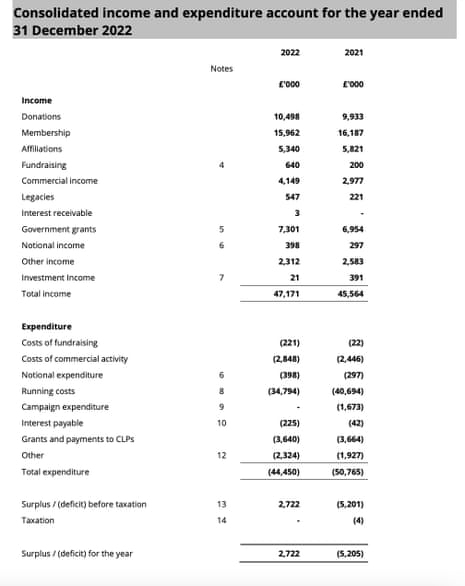
SNP says cost of living crisis to blame for party membership falling by 30,000 since 2021

Libby Brooks
The latest accounts from the Electoral Commission (see 12.18pm) reveal that SNP finances have been hit by a combination of falling membership and reduced donations, with the party recording a loss of over £800,000. That is its second biggest deficit ever recorded and second largest of any major UK political party.
SNP treasurer Stuart McDonald blamed the drop in membership from 104,000 in 2021 to 74,000 by April this year on the cost of living crisis. This resulted in membership income falling from £2,516,854 in 2021 to £2,286,944 in 2022, while donations fell from £695,351 to £368,538.
He also underlined that his report “cannot and does not” comment on matters subject to the ongoing Police Scotland investigation, which is looking at the handling of £600,000 donations earmarked for a second independence referendum.
The accounts were submitted after an urgent search for auditors, after it emerged that the party had been without any accountants for months – a fact Humza Yousaf revealed he discovered only after he became leader.
The firm eventually hired, Auditors AMS, issued an unusual “health warning” on submission that some original documentation for cash and cheques received for membership, donations and raffle income were not kept by the party.
Unlock Democracy, which campaigns for democratic reform, says the Rishi Sunak case (see 9.44am) shows why the system by which MPs and ministers declare their interests needs to be made simpler and more transparent. This is from Tom Brake, its director and a former Lib Dem MP and minister.
Though this might have been an inadvertent breach, the PM sets the standard others will follow. People will be alarmed that even the PM doesn’t seem to understand the rules that govern MPs’ conduct.
Rishi Sunak must now ensure that the entire system of MP and ministerial accountability is made more simple and transparent. That this judgement runs to 37 pages shows the absurd complexity of the current system.
The system for MPs and ministers registering and declaring interests is a labyrinth. As the recent Westminster Accounts revelations have shown, it is unbelievably complicated to arrive at a clear picture of the interests that may be influencing their behaviour. This must change.
Justice secretary Alex Chalk announces independent inquiry into Andrew Malkinson miscarriage of justice case
Alex Chalk, the justice secretary, has announced an independent inquiry into the handling of the case of Andrew Malkinson, who was released from jail after spending 17 years in jail for a rape he did not commit.
Malkinson’s conviction was eventually quashed by the court of appeal, but the inquiry will examine why that took so long, examining the roles played by Greater Manchester police, the Crown Prosecution Service and the Criminal Cases Review Commission.
Chalk said:
Andrew Malkinson suffered an atrocious miscarriage of justice and he deserves thorough and honest answers as to how and why it took so long to uncover.
The core function of our justice system is to convict the guilty and ensure the innocent walk free. Yet a man spent 17 years in prison for a crime he did not commit while a rapist remained on the loose. It is essential that lessons are learned in full.
Danny Shaw, the home affairs commentator, says this means there are now four inquiries into this case.
BREAKING Independent inquiry ordered into Andrew Malkinson case @MoJGovUK & @attorneygeneral say it will examine @gmpolice @ccrcupdate & @CPSUK
So: there are now 4 inquiries:
CCRC review -Chris Henley KC
@policeconduct – IOPC – into GMP
Law Commission project
& this one
Government spending on asylum has almost doubled in past year to £4bn, figures show
Government figures out today show that the Home Office spent £3.97bn on asylum in the UK in 2022-23, nearly double the £2.12bn figure for 2021-22. As PA Media reports, a decade ago, in 2012-13, the total stood at £500.2m.
Labour party membership fell by almost 25,000 in 2022, while its income rose, figures show
Labour party membership continued to slide last year even as the party enjoyed one of its most financially successful years in recent history, PA Media reports. PA says:
Annual accounts published by the Electoral Commission show Labour had 407,445 members at the end of 2022, down almost 25,000 compared with 2021.
This was well below the recent membership peak recorded at the end of 2019, when there were 532,046 Labour members.
But Labour still achieved some of its highest income levels outside an election year, raising £47.2m and returning a £2.7m surplus after losing £5.2m in 2021.
A report from party treasurer David Evans said “difficult decisions” on reducing costs had contributed to returning Labour to surplus, while membership income “exceeded targets” thanks to new members and “an improved rate of retention”.
Meanwhile, the Conservatives recorded a loss of £2.3m in what the party described as a “turbulent year”.
Income from donations fell by £2.4m compared with 2021, with party officials saying this was partly due to “donor pledges moving into 2023”.
The party does not publish its total membership figure, but income from membership fees fell slightly from £1.99m to £1.97m. Around 170,000 people were eligible to vote in the summer leadership election last year.
The Liberal Democrats recorded a deficit of £753,789 in 2022, including a £185,839 loss incurred due to cancelling the party’s annual conference following the death of Elizabeth II.
The party did, however, record a slight increase in membership from 94,706 to 97,493.
The SNP recorded a deficit of £804,000 during 2022, which it said was not “out of keeping with other years in which nation-wide elections were fought”.
The party’s accounts also show a significant decline in membership since the end of 2021, when there had been 103,884 SNP members.
By the end of 2022, that figure had fallen to 82,598 while the accounts show that number had fallen even further by the end of June 2023, reaching 73,936.
UPDATE: The Labour accounts are here. And this is what they say about membership.
As at 31 December 2022 the total individual membership of the party was 407,445 (2021: 432,213)
New figures suggest PM will struggle to keep pledge to clear ‘legacy’ backlog of asylum claims by December, experts say
In December last year, when he announced full details of his plans to stop small boats, Rishi Sunak said that he would clear the “legacy” backlog of asylum application claims by the end of 2023.
The Migration Observatory thinktank says today’s figures (see 10.11am) suggest it is hard to see how Sunak will achieve this goal. In an analysis it says:
Rishi Sunak pledged to clear the “legacy backlog” – the number of cases that were awaiting a decision on the 28th June 2022 – by the end of the year. Today’s data show that this specific group has fallen from around 99,000 on 30 June 2022 to 68,000 in June 2023. Since Sunak made his pledge in December 2022, the legacy backlog has been reduced by only around a quarter (23%) as of 30 June 2023, while half of the time to the deadline has elapsed.
However, the total backlog of applications has increased by 2,000 since the end of 2022, because 79,000 claims have been added to the ‘flow backlog’ (referring to claims submitted on or after 28 June 2022), of which 66,000 were awaiting a decision as of 30 June 2023.
Peter William Walsh, a senior researcher at the thinktank, said:
The backlog remains stubbornly high, despite falling numbers of asylum claims and more asylum caseworkers in the Home Office. It’s becoming harder to see how the government can meet its pledge to eliminate the so-called ‘legacy backlog’ of older claims by the end of the year, as the rate of decision-making would have to be more than doubled.
41% of asylum applications in year ending June 2023 from small boat arrivals, down from 45% previous year, figures show
Today’s Home Office figures show that 41% of people who applied for asylum in the UK in the year ending in June 2023 arrived on a small boat. That is done from 45% in the previous year.
The Migration Observatory, a migration thinktank based at the University of Oxford, says this suggests the public debate on this is skewed. In a press statement, Peter William Walsh, one of its senior researchers, says:
Political debate has been hyper-focused on small boats, 90% of whom claim asylum. Yet in the year to June 2023, small boat arrivals made up only 41% of asylum claims – the remainder will have arrived in the UK via other routes.





